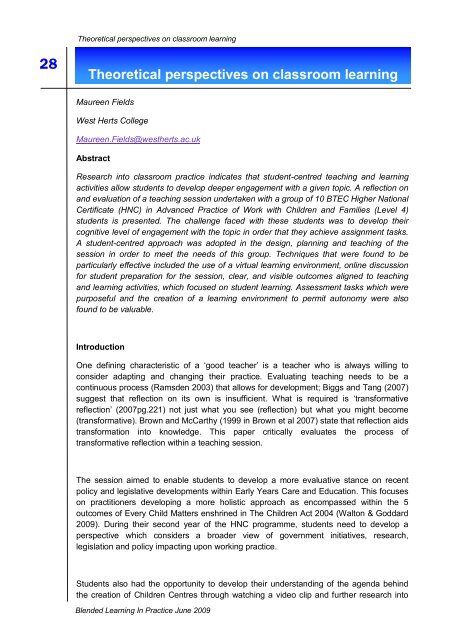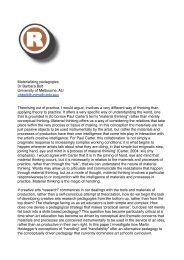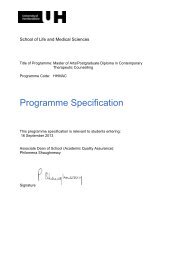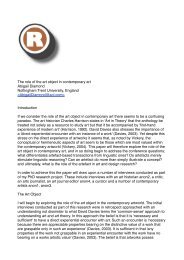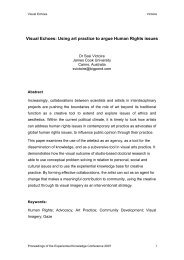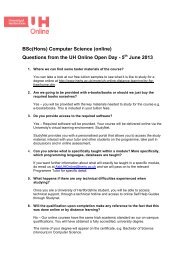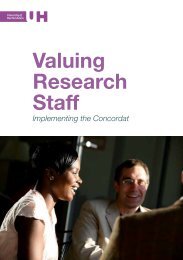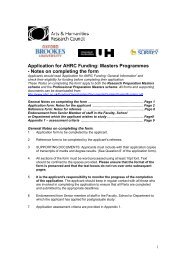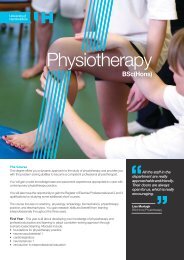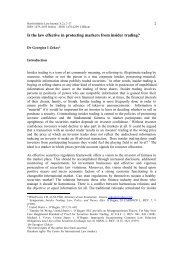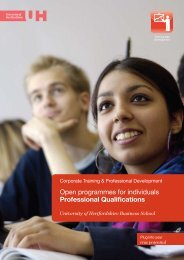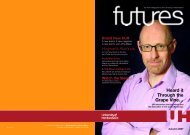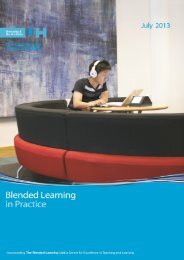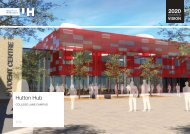June 2009 - University of Hertfordshire
June 2009 - University of Hertfordshire
June 2009 - University of Hertfordshire
You also want an ePaper? Increase the reach of your titles
YUMPU automatically turns print PDFs into web optimized ePapers that Google loves.
Theoretical perspectives on classroom learning<br />
28<br />
Theoretical perspectives on classroom learning<br />
Maureen Fields<br />
West Herts College<br />
Maureen.Fields@westherts.ac.uk<br />
Abstract<br />
Research into classroom practice indicates that student-centred teaching and learning<br />
activities allow students to develop deeper engagement with a given topic. A reflection on<br />
and evaluation <strong>of</strong> a teaching session undertaken with a group <strong>of</strong> 10 BTEC Higher National<br />
Certificate (HNC) in Advanced Practice <strong>of</strong> Work with Children and Families (Level 4)<br />
students is presented. The challenge faced with these students was to develop their<br />
cognitive level <strong>of</strong> engagement with the topic in order that they achieve assignment tasks.<br />
A student-centred approach was adopted in the design, planning and teaching <strong>of</strong> the<br />
session in order to meet the needs <strong>of</strong> this group. Techniques that were found to be<br />
particularly effective included the use <strong>of</strong> a virtual learning environment, online discussion<br />
for student preparation for the session, clear, and visible outcomes aligned to teaching<br />
and learning activities, which focused on student learning. Assessment tasks which were<br />
purposeful and the creation <strong>of</strong> a learning environment to permit autonomy were also<br />
found to be valuable.<br />
Introduction<br />
One defining characteristic <strong>of</strong> a „good teacher‟ is a teacher who is always willing to<br />
consider adapting and changing their practice. Evaluating teaching needs to be a<br />
continuous process (Ramsden 2003) that allows for development; Biggs and Tang (2007)<br />
suggest that reflection on its own is insufficient. What is required is „transformative<br />
reflection‟ (2007pg.221) not just what you see (reflection) but what you might become<br />
(transformative). Brown and McCarthy (1999 in Brown et al 2007) state that reflection aids<br />
transformation into knowledge. This paper critically evaluates the process <strong>of</strong><br />
transformative reflection within a teaching session.<br />
The session aimed to enable students to develop a more evaluative stance on recent<br />
policy and legislative developments within Early Years Care and Education. This focuses<br />
on practitioners developing a more holistic approach as encompassed within the 5<br />
outcomes <strong>of</strong> Every Child Matters enshrined in The Children Act 2004 (Walton & Goddard<br />
<strong>2009</strong>). During their second year <strong>of</strong> the HNC programme, students need to develop a<br />
perspective which considers a broader view <strong>of</strong> government initiatives, research,<br />
legislation and policy impacting upon working practice.<br />
Students also had the opportunity to develop their understanding <strong>of</strong> the agenda behind<br />
the creation <strong>of</strong> Children Centres through watching a video clip and further research into<br />
Blended Learning In Practice <strong>June</strong> <strong>2009</strong>


